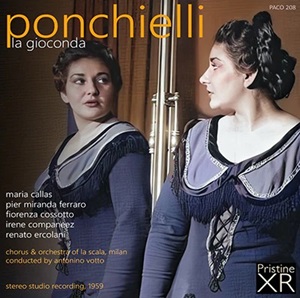
Amilcare Ponchielli (1834-1886)
La Gioconda (1876)
Maria Callas (soprano) – La Gioconda; Fiorenza Cossotto (mezzo-soprano) – Laura; Irene Companeez (contralto) – La Cieca; Ivo Vinco (bass) – Alvise; Pier Miranda Ferraro (tenor) – Enzo Grimaldo; Piero Cappuccilli (baritone) – Barnaba
Chorus and Orchestra of La Scala, Milan/Antonino Votto
rec. 1959, Teatro alla Scala, Milan
Reviewed as download from press preview
Full score, vocal score and Italian libretto enclosed
Pristine Audio PACO208 [166]
In his critical guide Opera Recordings, issued in 1973, Kenn Harris writes: “If ever there were a singer’s opera, it is La Gioconda. The libretto … is preposterous, the orchestral writing is subordinate, but given six fine, Italianate singers, this opera by Puccini’s principal teacher soars.” Even though I don’t agree with Harris about the subordinate orchestral writing – there are numerous examples of delicate instrumentation in the well-known Dance of the Hours and elsewhere – he hits the nail on the head when it comes to vocal qualities. The score overflows with attractive melodies, all six main characters are offered grateful solos, and the chorus is treated to plenty of opportunities to shine.
Harris lists five recordings, available at the time of writing: the two Callas sets, a Decca set under Gavazzeni with Anita Cerquetti in the title role, an RCA recording under Previtali with Milanov and the most recent then, Lamberto Gardelli’s Decca recording with Tebaldi as Gioconda. The last two were his preferred choices. During the half-century that has passed since that rating, only three new recordings have been added to the list – as far as I know. In 1980 Decca issued a third version with Bartoletti conducting and Montserrat Caballé in the title role, six years later Hungaroton offered a recording with Giuseppe Patanè at the helm and Eva Marton as Gioconda. Finally in 2002 EMI recorded it in Munich under Marcello Viotti with Violeta Urmana as Gioconda. The rest is silence.
To pick an outright winner in this illustrious company is difficult. All have great merits but also some weaknesses. I have a soft spot for the old Gavazzeni with Cerquetti in her only complete studio recording, but Gardelli is also fine, even if Tebaldi is a bit past her best. Concerning the present issue in a new XR remastering by Andrew Rose, I am in two minds. The stereo sound was from the very beginning very good, but the XR processing has made it even more transparent and airy. It is a pleasure to be able to savour the chamber music delicacies of the scoring of the ballet sequence in the third act, and the voices leap out of the speakers with stunning clarity. This also reveals that Callas at this stage of her development not always has full control over her vibrato, but at the same time her undeniable intensity comes over so much more.
La Gioconda was an important milestone in her career. It was through this role she had her breakthrough at the arena di Verona in 1947 and she returned to it on many occasions. It was the first opera she recorded commercially, in September 1952 for the Italian company Cetra. Technically it was rather primitive, but it has been very successfully refurbished and my copy on Alto is surprisingly clean – though it is of course in mono. Callas is very good here and is fresher than seven years later, but the supporting cast is rather mediocre – except for Giulio Neri’s black and steady Alvise and Fedora Barbieri’s superb Laura. On the remake she also has a magnificent Laura at hand, the then 24-year-old Fiorenza Cossotto, whose golden voice rings out with immense power and beauty. Her real-life husband Ivo Vinco, singing Alvise, is also masterly, and his aria in Act III is one of the real highlights. The little known Irene Companeez delivers a good Voce di donna, sounding a bit old, which is in line with the character. Piero Cappuccilli, relatively early in his distinguished career, is steady of tone but lacks the venom in his voice which is necessary for such an evil character as Barnaba. Pier Miranda Ferraro – whose only role in a major recording this is, to my knowledge – is not without merits. He nuances well, but he bawls Cielo e mar. As for Callas, she has a unique insight in the role, and no one who loves this opera can afford to be without this recording – preferably also her earlier effort, since the two complement each other.
Göran Forsling
Availability: Pristine ClassicalOther cast
Leonardo Monreale (bass) – Zuane; Carlo Forti (bass) – Cantore, Pilota; Renato Ercolani (tenor) – Isepo, Prima voce lontana; Aldo Biffi (tenor) – Seconda voce lontana; Bonaldo Giaiotti (bass) – Un barnabotto


















